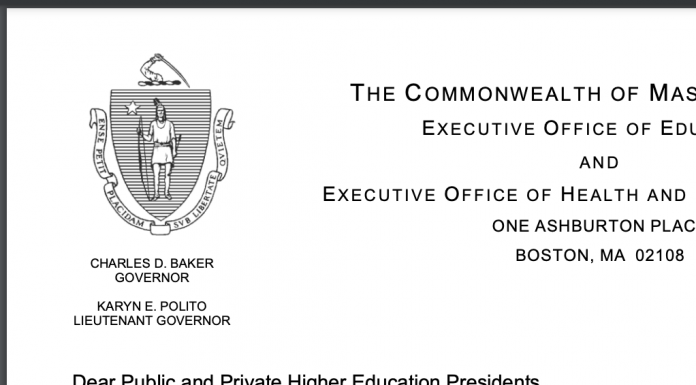BOSTON (CBS) – State health and education leaders said in a letter to the presidents of Massachusetts colleges and universities that they should start returning to “near normal” with the goal “to transition the COVID-19 pandemic into an endemic.”
Sec. of Education James Peyser and Sec. of Health and Human Services Marylou Sudders sent the letter to public and private higher education presidents on Friday.
“Together, our goal must now be to transition the COVID-19 Pandemic into an endemic, a highly contagious virus that is manageable and allows us to regain a sense of normalcy,” the letter said.
“Colleges and universities should accelerate their efforts to transition back to “near normal” conditions … ” – James A. Peyser, Massachusetts Secretary of Education and Marylou Sudders, Secretary of Health and Human Services
Peyser and Sudders pointed the rapid testing options, digital vaccine cards, and the state’s high vaccination rate as tools that can help “navigate the careful transition into opening up our society while simultaneously employing public health mitigation strategies.”
The letter warned colleges and universities about the “twindemic,” which is the combined negative impact of COVID and social isolation … READ MORE.
FULL TEXT OF LETTER:
January 28, 2022
Dear Public and Private Higher Education Presidents,
Together, our goal must now be to transition the COVID-19 Pandemic into an endemic, a highly contagious virus that is manageable and allows us to regain a sense of normalcy.
The science, our understanding, and the tools available continue to evolve.
Today, we have diagnostic, rapid antigen and surveillance testing, high throughput in-state testing capacity, digital vaccine cards, a digital notification system, robust data reporting, public health risk mitigation strategies, and most important effective and safe vaccines.
In a state with one of the highest vaccine acceptance rates in the country, we must navigate the careful transition into opening up our society while simultaneously employing public health mitigation strategies.
The “twindemic” is COVID and social isolation. The impact of two years of social isolation, anxiety, stress and depression is profound and one we must confront and support individuals, their loved ones, and our community. With virtually all students and staff vaccinated, higher education has the opportunity to lead — transitioning back to “near normal.”
Early in the pandemic, we made trade-offs, and veered on the side of remote learning and isolation. Overly strict protocols that inhibit any level of social interaction are counterproductive, at this time. Now is the time to reconsider these protocols to help promote a return to healthy social interactions, including: remote learning;
restricting or discouraging group activities; overly aggressive surveillance testing; and mask type requirements.
Colleges and universities should accelerate their efforts to transition back to “near normal” conditions, which include focusing on individuals who manifest COVID symptoms and test positive for COVID, and especially those who are particularly at-risk for serious illness and hospitalization. Along with relaxation of strict protocols, must be active, supportive communication and teaching about how to engage within their community
safely.
Equally important, colleges should continue to increase their investments in mental health services to address the widespread issues of anxiety and depression that have been exacerbated by the challenges of the past two years. Together, we must lean in with individuals who are struggling to find a sense of equilibrium and community. It may take time, but together we can move forward.
Sincerely,
James A. Peyser, Secretary of Education
Marylou Sudders, MSW, ACSW, Secretary of Health and Human Services



